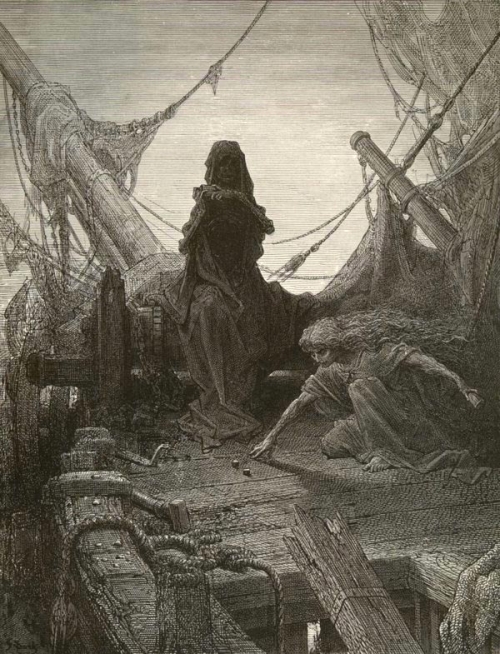Friday – Halloween Edition
Reposted and reworked from October 31, 2013
Have you ever thought of Rime of the Ancient Mariner as a Halloween poem? Along with its gothic elements, it has at least one stanza that describes the trick-or-treating experience of timid children.
The poem is filled with spooky images. To begin with, there are the two dice players aboard the skeleton ship who are competing for the mariner. The winner, “Life in Death,” has a great Halloween get-up:
Her lips were red, her looks were free,
Her locks were yellow as gold:
Her skin was as white as leprosy,
The Night-mare LIFE-IN-DEATH was she,
Who thicks man’s blood with cold.
And then there are all those corpses—the mariner’s former crew mates–who are reanimated to man the ship. Think of them as the living dead:
The loud wind never reached the ship,
Yet now the ship moved on!
Beneath the lightning and the Moon
The dead men gave a groan.They groaned, they stirred, they all uprose,
Nor spake, nor moved their eyes;
It had been strange, even in a dream,
To have seen those dead men rise.The helmsman steered, the ship moved on;
Yet never a breeze up-blew;
The mariners all ‘gan work the ropes,
Where they were wont to do;
They raised their limbs like lifeless tools—
We were a ghastly crew.The body of my brother’s son
Stood by me, knee to knee:
The body and I pulled at one rope,
But he said nought to me.
The mariner’s description of how the corpses creep him out is very much like how a child on Halloween imagines monsters behind every tree:
Like one, that on a lonesome road
Doth walk in fear and dread,
And having once turned round walks on,
And turns no more his head;
Because he knows, a frightful fiend
Doth close behind him tread.
So, are you scared now? But wait a moment, I have something even more frightening. What if Coleridge’s LIFE IN DEATH is actually a metaphor for debilitating depression? What if, after such a promising opening to his voyage, Coleridge is in the grip of a mental breakdown which makes all the world around him seem dead and sterile. “The very deep did rot,” he says at point. He feels so hopeless that even praying is beyond his grasp. As he will explain it later,
Oh wedding guest, this soul hath been
Alone on a wide, wide sea:
So lonely ’twas, that God himself
Scarce seemed there to be.
Luckily, for kids going out trick-or-treating, they get to return to a safe home after flirting with fright. In the poem, meanwhile, the monsters turn into something positive. Just as the sea snakes change from “slimy things” to “happy living things” that are stunningly beautiful, so the corpses are revealed to be “a troop of spirits blest” who make beautiful music and then light up the landscape as shining seraphs.
Inspect a monster closely enough and you will find a beautiful soul somewhere within.
Is this the true spirit of Halloween?


